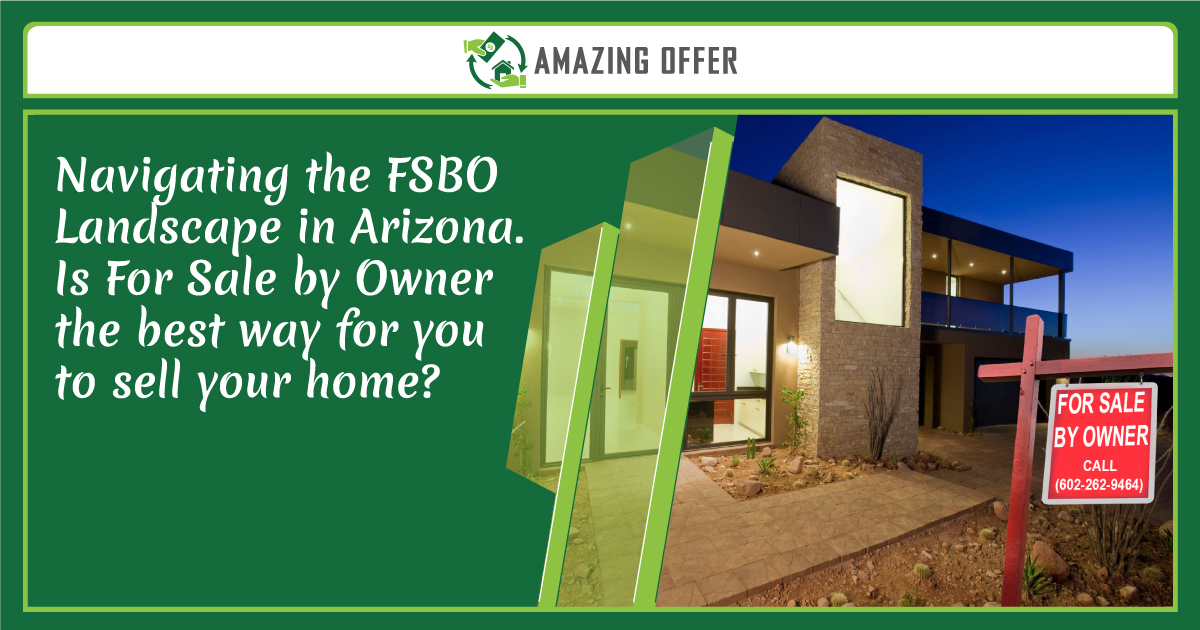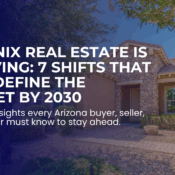FSBO Arizona: Guide on Selling Your House by Owner
For Sale By Owner: How to Sell Your Home with a Real Estate Agent and save money.

Amazing Offer has crafted this guide after consulting Arizona real professionals, diving into the Arizona real estate market, and researching FSBO Arizona companies and alternatives.
Opting to sell your Arizona home without a real estate agent means bypassing the typical Arizona listing commission, which averages 2.69% of your home’s sale price.
This decision could result in savings of approximately $12,000, give or take, based on the average home price in Arizona.
However, to enjoy these savings, you must undertake all the responsibilities typically handled by a real estate agent, such as setting the price, arranging showings, and negotiating with potential buyers.
Even after securing a buyer, you will still need to navigate the intricate closing process, which can be challenging even for industry professionals. The additional workload explains why only 10% of home sales are categorized as for sale by owner.
“FSBO” in Arizona is recommended only for individuals with the requisite experience and knowledge to manage a home sale. This guide aims to assist you in determining whether selling your Arizona home without a realtor aligns with your circumstances.
Who Should Consider Selling a House by an Owner?
Before deciding whether to sell your Arizona property, weigh the pros and cons of FSBO Arizona. The selling process demands a lot of time and energy, like a part-time job.
Selling by owner in Arizona might be suitable for you if:
- You have previous experience selling a home, with or without the aid of a build rapport to avoid the unnecessary excessive hold. Experience is crucial for FSBO sellers; learning on the fly often leads to stress and errors.
- You have access to a real estate expert for guidance. Having a friend or family member willing to offer advice without charge provides a valuable support system when unsure of what steps to take.
- You have sufficient free time in your schedule. Selling a home is not a weekend project; you must stay organized to schedule showings and address inquiries.
- You already have a buyer lined up. While having a prospective buyer simplifies the process, you must still be prepared for the closing procedures.

You desire complete control over your home sale. FSBO Arizona allows you to make all major decisions without the involvement of a realtor.
For those focused on saving money on realtor commissions, it is worth exploring real estate agents who offer lower-than-average commission rates. Amazing Offer connects sellers in Arizona with experienced local professionals who provide streamlined services and can even buy your house “As-Is.”
This option saves you money and avoids the hassle of managing the process independently.
In addition to considering FSBO Arizona, reach out to Amazing Offer to receive an AS-IS cash offer.
How to Sell a House by Owner in Arizona
Here are six steps to sell a house by owner in Arizona:
- Prepare your home for sale.
- Set an appropriate price.
- List your home.
- Highlight your home.
- Negotiate the best price.
- Complete the closing process.

As an FSBO Arizona seller, it is crucial to understand all your responsibilities, including preparing your home for sale, accurately pricing it, attracting buyers, negotiating, and completing the necessary paperwork as per state regulations.
The regulations governing real estate can differ from one area to another. For example, in certain states, if sellers choose to list their property on the multiple listing service (MLS) via a flat-fee service, they are not allowed to put up a For Sale By Owner (FSBO Arizona) sign on their property.
Here is a summary of the key laws in Arizona:
Arizona FSBO Facts:
- Is a real estate attorney required? No
- Is an FSBO Arizona yard sign allowed? Yes
- Required state disclosures:
- Seller’s property disclosure statement
- Flood zone statement
- Lead-based paint disclosure
Although selling your home without a realtor may initially seem like a straightforward way to save on fees, it is often more complex than anticipated.
If the process of selling your home becomes overwhelming, remember you always have the option to enlist the services of an agent. However, for those who prefer a more straightforward and time-efficient solution, selling your house AS-IS to Amazing Offer, Arizona’s leading home buyer, may be the smarter choice. This option is particularly appealing for those who lack the time or inclination to manage a For Sale By Owner (FSBO Arizona) transaction.
This option eliminates the challenges of FSBO Arizona while ensuring you retain the maximum proceeds from the sale.
Choosing to sell your house AS-IS to Amazing Offer, Arizona’s leading home buyer, may be the ideal solution for those looking to expedite the process, as we can close the deal within 3-5 business days, significantly faster than traditional methods.
Step 1: Prepare Your Home for Sale
Completing necessary repairs can significantly enhance your home’s value even in a robust seller’s market. According to Scottsdale-based realtor Lisa Dixon, focusing on the following common repairs is advisable:
Addressing cosmetic issues such as replacing light switches.
Repairing the roof of older homes by replacing or resealing tiles and installing new underlayment.
Installing Ground-Fault Circuit Interrupter (GFCI) outlets, especially in homes constructed before GFCI became mandatory.
Stage and Photograph Your Home
Professional photos are essential for your listing, and presenting a clean and well-furnished home can attract potential buyers. Begin by decluttering, deep cleaning, and enhancing your home’s curb appeal.
A well-staged home facilitates quicker sales and can fetch a higher price. Dixon suggests that professional staging can increase the value of a high-end home by approximately $65,000 over the asking price.
Companies like Staged with Love, based in Scottsdale, offer professional staging services for around $3,500 monthly. While this may seem like an investment, the potential increase in your home’s value far outweighs the cost.
Some sellers may need to pay more attention to staging, assuming Arizona’s strong seller’s market necessity necessities.
“However, staging a home, especially larger ones, provides prospective buyers with a clear vision of how their furniture would fit and look,” notes Dixon.
Generally, professional home staging involves the complete design of key areas such as the living room, kitchen, dining room, master bedroom, and bathrooms, often for a duration of 60 to 90 days, or roughly three months. The cost can differ based on geographical location, making it a good idea to reach out to local firms for pricing quotes.
Step 2: Set a Price
The pricing strategy is pivotal in the FSBO Arizona selling process. Pricing your home too low can result in leaving money on the table, while pricing it too high might lead to a stagnant listing and necessitate price reductions, potentially raising concerns among buyers.
Obtaining a pre-sale appraisal provides a more accurate understanding of your home’s reasonable value, serving as an excellent starting point for determining your listing price.
In Arizona, appraisals typically cost between $310 to $395 but can yield thousands more upon selling your home.
Additional tip: Seeking a comparative market analysis from Amazing Offer, analyzing recently sold comparable properties in your neighborhood can also aid in setting the right price. Amazing Offer this service free of charge.
State of the Arizona Real Estate Market
Understanding the trajectory of the market is crucial for accurately pricing your home. Like nationally, Arizona’s housing market is cooling off.
While selling your home may require more effort than a year ago, you can still fetch a favorable price, as home prices have only decreased by 2.1% from the previous year.
However, home values vary across cities within the state, and determining the appropriate price for your home depends on its location.
Here are the median home values for some of Arizona’s major cities:
- Phoenix: $444,800
- Tucson: $339,700
- Yuma: $269,000
- Flagstaff: $595,000
- Sierra Vista: $240,400
The number of homes sold declined by 45% from December 2021 to December 2022, and the median days on the market nearly doubled from 35 to 67.
While a slower market implies reduced competition, necessitating patience and accurate pricing from the outset to avoid prolonged listings, FSBO Arizona remains a viable option for maximizing profits.
Step 3: List Your Arizona Home
Once you have determined the price, crafting a listing description tailored to local buyers’ preferences is essential.
Understanding their priorities enables you to highlight relevant features of your property effectively. Here are some key buyer priorities in Arizona and advice for FSBO Arizona sellers:
Energy-Efficient Home: Given Arizona’s sweltering temperatures, an energy-efficient home, particularly one equipped with a solar panel system (preferably owned), is highly desirable.
Extra Space: With the surge in remote work, home offices have become a top priority for buyers. Highlighting ample space for work-from-home setups can be advantageous.
Renovations and Repairs: Buyers are willing to pay a premium for renovated bathrooms with spa-like features and properly maintained roofs. Ensuring electrical safety with GFCI outlets is also crucial.
Listing Price: Researching and pricing your home appropriately based on its features and neighborhood comparables is essential to attract buyers. While Arizona’s market favors sellers, significantly overpricing your home can deter potential buyers.
Where to List Your Home
Utilizing the Multiple Listing Service (MLS) is ideal for marketing your home, as MLS listings appear on prominent real estate websites like Zillow, Redfin, and Realtor.com, increasing your online visibility.
However, only agents can be listed on the MLS. As an FSBO Arizona seller, you can maintain control over your sales by partnering with Amazing Offer, which uses a flat-fee MLS service, allowing a one-time payment to list your home.
Alternatively, several free or low-cost options are available for FSBO sellers:
Zillow: Offers free listings, although recent changes may limit visibility.
ForSaleByOwner.com: A dedicated platform for FSBO Arizona listings but does not syndicate to other real estate websites.
For-Sale-By-Owner Yard Sign: Purchase an FSBO Arizona sign for a nominal fee from hardware stores or online retailers.
Craigslist: Post your listing in the real estate section for free.
Moreover, leveraging social media platforms such as YouTube, Instagram, Facebook, and TikTok for marketing purposes can further expand your reach to potential buyers.
Step 4: Show Your Home
Maintaining organization during home shows is paramount. Establishing a robust scheduling system and diligently recording buyers’ and agents’ contact information is essential.
Flexibility in accommodating showing requests is also advisable.
Ensure your home remains clean and clutter-free to make a favorable impression on potential buyers.
Avoid last-minute cleaning scrambles by keeping your home tidy consistently.
Step 5: Get the Best Possible Price through Negotiations
Talks extend beyond the final sale price and encompass various aspects such as contract contingencies, division of closing costs, and timelines.
Offering creative seller concessions can strengthen your negotiating position and potentially lead to a higher final sale price.
Understanding buyer priorities in your area aids in tailoring your offer effectively. In Arizona, sellers commonly cover 1.30% to 2.10% of buyers’ closing costs, which on a home of median value amounts to an additional $5,445 to $8,796.
Consider offering popular seller concessions such as:
- Home Warranty
- Property Taxes
- Repair Credits
Step 6: Close
The closing marks the culmination of the real estate transaction, where the property’s title officially transfers from the seller to the buyer, and both parties settle their closing costs.
Engaging a title company streamlines the closing process, as they oversee the collection and distribution of closing costs, obtain necessary signatures, ensure compliance with relevant documents, and file them with appropriate agencies.
While real estate attorneys are not mandatory for selling a home in Arizona, their expertise can ensure legal compliance and protect against potential lawsuits.
Although attorneys may not possess local market knowledge, they can assist in negotiating favorable terms and safeguard against contractual breaches.
Navigating the paperwork involved in an FSBO Arizona transaction requires attention to detail. Essential documents include the seller’s property disclosure statement, flood zone statement, lead-based paint disclosure, and Arizona radon fact sheet.
It is advisable to seek legal guidance or utilize online resources to ensure compliance with state requirements.
FSBO Arizona offers a viable avenue for maximizing profits, but it is essential to approach the process with diligence and thorough preparation to achieve a successful sale.
Paperwork for Selling a House by Owner in Arizona
In a standard real estate transaction, your agent typically handles the paperwork and ensures all necessary documents are completed.
However, as an FSBO Arizona (For Sale by Owner) seller, you must navigate the paperwork independently. Here is a concise overview of Arizona’s requirements:
The closing process for selling a property involves providing specific documents to ensure a legal and transparent transaction. These typically include:
- Two Forms of Identification: Sellers are often required to present two forms of identification, which can include a valid passport, driver’s license, or other state-issued ID, ensuring the seller’s identity is verified.
- Copy of the Purchase and Sale Agreement and Addendums: This document packet should contain the original purchase and sale agreement, duly signed, along with any amendments or additional agreements made between the buyer and seller.
- Closing Statement: This is a comprehensive itemization of all the costs involved in the sale, detailing the financial responsibilities of each party, usually prepared by the escrow agent or the title company managing the closing.
- Signed Deed: The deed is a critical document that legally transfers ownership of the property from the seller to the buyer. It must be signed by the seller at the closing.
- Bill of Sale: This document acts as a detailed receipt of the transaction, listing the seller and buyer’s details, the final sale price, and any personal property included in the sale.
- Affidavit of Title: This notarized statement confirms the seller’s ownership of the property, certifies that there are no liens or other encumbrances on the property, and verifies that the property is not being sold to another party concurrently.
These documents collectively ensure that all aspects of the property sale are legally covered and transparently recorded, safeguarding the interests of both buyer and seller.
Additional Documents Include:
Loan Payoff Information: Documentation of remaining mortgage balance and any associated fees.
HOA Forms and Guidelines: If applicable, documents outlining HOA rules, fees, financial history, and approval processes.
Survey Results or Affidavits: Verification of property lines, either through a survey or statement of facts.
Home Inspection Results: Results of any pre-sale inspections, compared to the buyer’s inspection if applicable.
Based on the property’s value.
Home Warranty Information: Details of coverage, duration, and costs associated with the home warranty policy.
Copies of Relevant Legal Documents: For inherited properties, copies of wills, trusts, or power of attorney letters.
Relevant Affidavits: Such as name statements of facts or non-foreign statements of facts under IRC 1445, depending on circumstances.
Closing Disclosure: If the buyer is financing the purchase, a copy of their closing disclosure may be necessary to verify approved concessions.
Correction Statement and Agreement: Addressing any lost or erroneous documents requiring replacement or rectification.
Arizona Disclosure Forms Include:
Seller’s Property Disclosure Statement: Outlining known issues with the property, major appliances, and systems.
Flood Zone Statement: Required for federally backed mortgages, disclosing flood risk.
Lead-Based Paint Disclosure: Mandatory for homes built before 1978, disclosing lead-based paint dangers.
Arizona Radon Fact Sheet: Disclosing material facts about the property, including radon gas presence.
Where to Find Documents:
Numerous real estate forms can be found on the Arizona Realtors website or through online platforms like LawDepot, eForms, or US Legal.
Additionally, state, or local government offices such as tax assessor’s offices or departments of revenue may provide other necessary documents like tax records, property surveys, and deeds.
Remember, many closing documents are legally binding agreements, so errors can be costly.
Consider working with a low-commission realtor to mitigate risks and ensure a smooth transaction process.
Frequently Asked Questions
Is it legal to sell a house to an owner in Arizona?
Yes, it is legal to sell a house by owner in Arizona. However, it is important to comply with Arizona’s real estate laws and regulations, including disclosure requirements and paperwork.
How much money can I save by selling my house to the owner in Arizona?
By selling your house to the owner in Arizona, you can avoid paying the typical listing commission of around 2.69% of the home’s sale price, potentially saving thousands of dollars.
What are the risks of selling my house to the owner in Arizona?
Selling your house by owner in Arizona requires taking on all responsibilities typically handled by a real estate agent, such as pricing the home, scheduling showings, and navigating the closing process. Without experience or knowledge of the process, mistakes can occur, potentially resulting in selling the home for less than its market value.
Do I need to hire a real estate attorney to sell my house to an owner in Arizona?
While it is not required to hire a real estate attorney to sell your house by owner in Arizona, consulting with one can ensure compliance with local laws and protect against potential legal issues. However, working with a title company is more common for facilitating the closing process.
Can I still use the Multiple Listing Service (MLS) if I sell my house to the owner in Arizona?
As a for sale by owner (FSBO) seller in Arizona, you cannot directly list your home on the MLS. However, you can work with a flat-fee MLS company or a real estate agent who offers MLS services to increase your home’s visibility to potential buyers.
What documents do I need to sell my house by owner in Arizona?
Required documents for selling a house by owner in Arizona include a seller’s property disclosure statement, flood zone statement, lead-based paint disclosure (if applicable), as well as various other forms such as the purchase and sale agreement, closing statement, and signed deed.
How do I determine the selling price of my house in Arizona?
Pricing your house in Arizona involves researching comparable listings in your area, considering factors such as square footage, amenities, and recent sales prices. Additionally, obtaining a pre-sale appraisal can provide a more accurate assessment of your home’s reasonable value.




